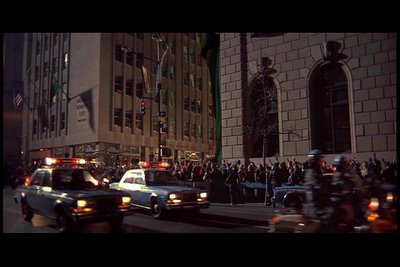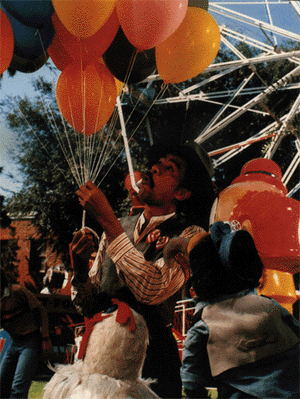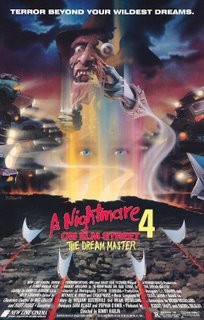 Note: The following is an abridged version of an essay I wrote for my "Kubrick & Kurosawa" class. I've ditched MLA citation format in this abridgement for reasons of length and because nobody outside of a classroom should be subjected to a lot of paranthetical page numbers. It also presumes familiarity with the film, so I don't recommend reading it if you haven't seen
Note: The following is an abridged version of an essay I wrote for my "Kubrick & Kurosawa" class. I've ditched MLA citation format in this abridgement for reasons of length and because nobody outside of a classroom should be subjected to a lot of paranthetical page numbers. It also presumes familiarity with the film, so I don't recommend reading it if you haven't seen The Shining
(which you really should).Forever and Ever and Ever: Enchantment, the Uncanny, and Kubrick's The ShiningEarly in his
The Uses of Enchantment, Bruno Bettelheim addresses the question of a child's ability to separate fairy tales from reality. "The child," Bettelheim explains, "intuitively comprehends that while these stories are
unreal, they are not
untrue; that while what these stories tell about does not happen in fact, it must happen as inner experience and personal development; that fairy tales depict in imaginary and symbolic form the essential steps in growing up and achieving an independent existence." Stanley Kubrick famously referred to
The Uses of Enchantment, as well as Freud's essay "The Uncanny," while writing the screenplay to
The Shining with Diane Johnson. These texts helped particularly in determining the nature of the Overlook Hotel's spectral guests; according to Johnson, "The psychological states of the characters can create real ghosts who have physical powers. If Henry VIII sees Anne Boleyn walking around the bloody tower, she's a real ghost, but she's also caused by his hatred."
Johnson's analogy demonstrates the key to Kubrick's film, which actually deviates from
Enchantment. While Bettelhem finds fairy tales to be harmless, Kubrick's film is about the horror of actually finding oneself in the midst of such a tale.
The Shining is about our inability to confront our irrational horrors, and what might happen to us if those fears were real.
Freud defines the uncanny as "that class of terrifying which leads back to something long-known to us, once very familiar." The release of
The Shining in 1980 followed a decade-long resurgence of popular interest in horror; echoes of "The Uncanny" can be found in
The Exorcist (re-emergence of religious horror),
Carrie (horror triggered by the awakening of puberty), and
Alien (horror that literally emerges from within), among many others. Stephen King's novel shares this Freudian set of concerns; a
New York Times piece notes that "In
The Shining, as in the best books and movies about the supernatural; we're forced back, and not gently, against that wall within ourselves, a wall constructed from lost innocence and intergenerational torment, from barely suppressed and highly atavistic fears, from doubts concerning our own sanity." Kubrick suggested similar motivations for adapting the novel, remarking that "One of the things that horror stories can do is to show us the archetypes of the unconscious: we can see the dark side without having to confront it directly."
Where Kubrick departs from King is in the nature of these unconscious fears. This is especially clear in the difference between the book's and film's versions of the relationship between struggling writer Jack Torrance and his son Danny. At the center of
The Shining is what Bettelheim describes as a fairy tale version of the oedipal conflict: "So the father who blocks the boy's oedipal desires is not seen as an evil figure within the home, or split into two figures, one good and one bad, as the mother often is. Instead, the oedipal boy projects his frustrations and anxieties onto a giant, monster, or dragon." Similarly, King's book depicts Jack as a sympathetic character who is forcibly compelled to harm his family by the malevolent hotel. But in Kubrick's film, the hotel is merely a catalyst - the Jack we meet at the beginning is already capable of becoming the monster we see at the end. Jack has a nightmare about murdering his family and exclaims, "Oh my God, I must be losing my mind!" Yet Kubrick includes details - inconsistencies between Jack and Wendy's stories about Danny's arm injury, for instance - that raise doubts about Jack's stability before arriving at the Overlook. Consider the "All work and no play" sequence, and the unanswered question it poses - how long has Jack been typing just that? Overnight? A week? All winter?
These details have led to the frequent criticism of the film, and more specifically Jack Nicholson's performance, as "over the top." Pauline Kael wrote in her review that "There's nothing he can do with the role except express the gleaming-eyed undercurrents of incipient madness while waiting to go whole-hog crazy." What Kael completely missed is how this change in character motivation makes the film more complex, and scarier, than the book. Simply put, the book is about evil spirits who compel a man to kill his family, while the film is about a man who
wants to kill his family and doesn't know it yet.
There are three scenes I'd like to discuss in this context. The first is the dialogue between Danny and Dick Halloran, the Overlook's chef, about their shared psychic abilities. Halloran fills the dual parent role that Bettelheim describes as "a means of preserving an internal all-good [parent] when the real [parent] is not all-good." When Danny asks Halloran if he is scared of the Overlook, he shrugs it off, saying, "There's nothing here." Yet when Danny presses him about Room 237, Halloran lies: "There ain't nothing in Room 237. But you ain't got no business going in there anyway. So stay out, you understand? Stay out!" Halloran is trying to placate the boy, yet the anxiety in his voice tells us there is indeed something to be afraid of. Bettelheim writes of this adult tendency to be dismissive of childish fears: "Since it creates discomfort in a parent to recognize these emotions in his child, the parent tends to overlook them, or he belittles these spoken fears out of his own anxiety, believing this will cover the child's fears." Halloran later dies because of his denial of what is literally around the corner.
Danny is later confronted by the ghosts of two girls who were brutally murdered by their father, a previous caretaker of the Overlook, ten years earlier. The sisters are a version of what Freud calls "the double," an invention of one's ego: "The quality of uncanniness can only come from the circumstance of the 'double' being a creation dating back to a very early mental stage, long since left behind, and one, no doubt, in which it wore a more friendly aspect. The 'double' has become a vision of terror, just as after the fall of religion the gods took on dramatic shapes." There are numerous instances of doubles in
The Shining - Danny's friend Tony, Charles Grady (caretaker) and Delbert Grady (servant), Jack 1980 and Jack 1921 - that transcend their psychological origins and manifest themselves in a tangible way. The sisters invite Danny to "come play with us - forever and ever and ever." A childhood convention has been turned into something dangerous here; we see this later when Jack references
The Three Little Pigs and Wendy's discovery of a dog-costumed man performing fellatio on a tuxedoed party guest. In this case, when the sisters leave, Tony attempts to reassure Danny, saying "Remember what Mr. Halloran said. It's just like pictures in a book, Danny. It isn't real." However, the look on Danny's face tells us that either Tony is lying or the reality of the ghosts is beside the point. Later, Danny will regress into the persona of his "double," and his reemergence signifies the confrontation of the uncanny and the putting away of childish things.
This scene has its own double in the later conversation between Jack and his son. Jack tells his son that he loves him, that he wants him to have a good time at the hotel. Then he echoes the Grady sisters: "I wish we could stay here forever and ever and ever." Jack has embraced the Overlook as though it were always a part of him (as the final scene suggests it has been). The oedipal conflict comes to the forefront here; what distinguishes this scene is that strips the film of the separation from literal fears that is essential to fairy tales. The source of our dread is made manifestly clear; it's not cackling corpses, phantom blowjobs, or bloody elevators. It's dad.
It is perhaps this directness that caused
The Shining to be met with a mixed reception upon its release. It went into wide release the same day that
Friday the 13th opened, placing it squarely on the divide between the existental dread of the seventies and the more physical horrors of the eighties (a 1981
Fangoria poll named
The Shining the worst recent horror film at the same time that
Friday the 13th was named the best). The film's departures from the more optimistic elements of the book led King to conclude, "You know what? I think he wants to hurt people with this movie. I think he really wants to make a movie that will hurt people." This criticism fits
The Shining just fine; it is a calculating, methodical dissection of our worst fears made literal, and King later conceded that "even when a director such as Stanley Kubrick makes such a maddening, perverse, and disappointing film as
The Shining, it somehow retains a brilliance that is inarguable; it is simply there."
Of course, Kubrick probably would have resisted this process of interpretation entirely. Commenting on his film, Kubrick said that "I read an essay by the great master H.P. Lovecraft where he said that you should never attempt to explain what happens, as long as what happens stimulates people's imagination, their sense of the uncanny, their sense of anxiety and fear." So I'll close with Lovecraft:
And then there came to me the crowning horror of all - the unbelievable, unthinkable, almost unmentionable thing. [...] Shall I say that the voice was deep; hollow; gelatinous; remote; unearthly; disembodied? What shall I say? It was the end of my experience, and is the end of my story.Just like pictures in a book.















